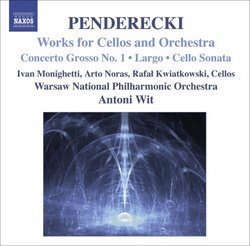| All Artists: Krzysztof Penderecki, Antoni Wit, Warsaw Philharmonic Orchestra Title: Krzysztof Penderecki: Works for Cellos and Orchestra Members Wishing: 0 Total Copies: 0 Label: Naxos Original Release Date: 1/1/2008 Re-Release Date: 10/28/2008 Genre: Classical Styles: Forms & Genres, Concertos, Instruments, Strings, Symphonies Number of Discs: 1 SwapaCD Credits: 1 UPC: 747313050970 |
Search - Krzysztof Penderecki, Antoni Wit, Warsaw Philharmonic Orchestra :: Krzysztof Penderecki: Works for Cellos and Orchestra
 | Krzysztof Penderecki, Antoni Wit, Warsaw Philharmonic Orchestra Krzysztof Penderecki: Works for Cellos and Orchestra Genre: Classical |
Larger Image |
CD Details |
CD ReviewsA must buy! Michael Suh | 09/14/2009 (5 out of 5 stars) "I'm probably a little biased on this disc since I play(ed) the cello. So I'll try not to gush too much.
This disc is incredible. Sure, a lot of Penderecki is starting to sound the same by this point -- those jagged little chromatic runs he sprinkles EVERYWHERE, everything is so serious and solemn, that infatuation with tritone is getting well-worn (it was well-worn after Britten couldn't give it up in his War Requiem, but no matter), and let's not forget his love for the one-note ostinato pounding over and over again that always makes an appearance. But the virtuosity that comes with his string works is present here, just like his Violin Concertos. The Concerto Grosso is written for 3 cellos, but I don't think Penderecki does that great of a job giving the 3 soloists a lot of opportunities to shine individually or as a group -- with the exception of a cadenza, they often sound like one instrument or just part of the masses; Penderecki clearly has a strong preference for heavy bass from the orchestra in general. It's still hugely dramatic and immediately accessible. Largo is similar in nature to the Concerto Grosso (not surprising since they were written a year apart), except the Largo has just one solo cellist. If you're casually breezing through the CD, you might mistake the Largo as an extension of the Concerto Grosso. It is written as a large arc with two "Adagio" movements on the outside and an "Andante con moto" in the middle. However, the middle movement has an extended episode that pits the soloist against the orchestra that's hard to call as slow as andante. It's ferocious and brilliant and a welcome break to the brooding quietness from the rest of work. The Sonata for Cello and Orchestra showcases Penderecki's genius during his avant-garde years. Written in 1964, it was written not too long after Polymorphia and the Threnody. It sounds similar to other avant-garde works of the time -- its two movement structure with different characters in each movement is similar to Lutoslawski's Symphony No. 2 (Hesitant and Direct), and the careful balance and study of color and dissonance suggests Ligeti stole a few ideas when he wrote his own Cello Concerto in 1966. The first movement of this Sonata feels introductory; ideas come and slowly melt from the soloist to the orchestra. A lot of pitch-bending slides make it a surreal experience, but ideas come and go much faster than Ligeti's works from this period (Atmospheres, Cello Concerto), which adds dramatic effect and provides momentum for the work. The second movement is more aggressive and capricious. While not "light-hearted" it shows flashes of cynical wit with some of its flourishes. The ending percussive gestures from the celllist and orchestra are the best way to round out the disc -- it makes me want to listen to everything all over again. If you're a fan of Penderecki's string works and Violin Conertos, this disc cannot be missed. And if you're not, this disc will almost certainly convince you the future of classical music isn't entirely bleak." |
